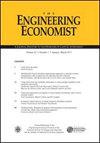The influence of gender-diverse boards on post-audit practices: A UK SME study
IF 1.2
4区 经济学
Q4 BUSINESS
引用次数: 0
Abstract
Abstract This article extends the project-engineering management/post-audit literature into the field of business ethics and board gender diversity. As a result, it fills an important gap in the literature. Board gender diversity is an important issue with ramifications on corporate decision-making. Based on a sample of 163 UK small-medium enterprises (SMEs), our research shows differences between gender diverse (GD) boards and male-only boards in post-audit (P-A) practices. GD boards conduct more post-audits and adopt a more formal approach to post-audit procedures. There are significant differences between the two board types concerning the reasons for undertaking post-audits and the non-adoption of post-audits (P-As). An interesting observation is in the area of risk aversion, as we find an inconsistency between those SMEs that conduct P-As and those that do not. This inconsistency may reflect the earlier literature, which is inconclusive in its findings concerning females’ attitudes to risk. A further interesting observation from the data analysis shows that GD Boards appear to be more focused, while male boards are more diverse in their responses. This article is of relevance and general interest to engineering economists in an investment appraisal, P-A, project management, and governance environment, fostering diversity and equality in regulating corporate activities, assisting practitioners and policy-makers in understanding the importance of monitoring capital projects, and the role played by gender-diverse boards.性别多元化董事会对审计后实践的影响:一项英国中小企业研究
摘要本文将项目工程管理/审计后文献扩展到商业道德和董事会性别多样性领域。因此,它填补了文献中的一个重要空白。董事会性别多样性是一个重要问题,对公司决策产生影响。基于163家英国中小企业的样本,我们的研究表明,性别多元化(GD)董事会和仅限男性的董事会在审计后(P-a)实践中存在差异。GD董事会进行更多的事后审计,并对事后审计程序采取更正式的方法。两种类型的董事会在进行事后审计和不采用事后审计的原因方面存在重大差异。一个有趣的观察结果是在风险规避领域,因为我们发现那些进行P-as的中小企业和那些不进行P-A的中小企业之间存在不一致。这种不一致性可能反映了早期的文献,这些文献在关于女性对风险态度的研究中没有结论。数据分析中的另一个有趣观察结果显示,GD董事会似乎更专注,而男性董事会的反应更为多样。这篇文章与工程经济学家在投资评估、P-A、项目管理和治理环境中的相关性和普遍性有关,在监管企业活动方面促进多样性和平等,帮助从业者和决策者理解监督资本项目的重要性,以及性别多样性董事会所发挥的作用。
本文章由计算机程序翻译,如有差异,请以英文原文为准。
求助全文
约1分钟内获得全文
求助全文
来源期刊

Engineering Economist
ENGINEERING, INDUSTRIAL-OPERATIONS RESEARCH & MANAGEMENT SCIENCE
CiteScore
2.00
自引率
0.00%
发文量
14
审稿时长
>12 weeks
期刊介绍:
The Engineering Economist is a refereed journal published jointly by the Engineering Economy Division of the American Society of Engineering Education (ASEE) and the Institute of Industrial and Systems Engineers (IISE). The journal publishes articles, case studies, surveys, and book and software reviews that represent original research, current practice, and teaching involving problems of capital investment.
The journal seeks submissions in a number of areas, including, but not limited to: capital investment analysis, financial risk management, cost estimation and accounting, cost of capital, design economics, economic decision analysis, engineering economy education, research and development, and the analysis of public policy when it is relevant to the economic investment decisions made by engineers and technology managers.
 求助内容:
求助内容: 应助结果提醒方式:
应助结果提醒方式:


